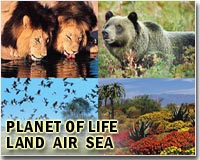 |
Nagoya, Japan (AFP) Oct 30, 2010 Green groups welcomed on Saturday a UN treaty aimed at protecting the world's threatened ecosystems, saying it laid the foundations for stopping the alarming loss of biodiversity. Some expressed disappointment that the pact, forged after two weeks of intense diplomacy at a summit in the central Japanese city of Nagoya, was not more ambitious. But the general sentiments were that the accord, which committed countries to achieving 20 key targets over the next decade on curbing the destruction of nature, was a major success. "This agreement reaffirms the fundamental need to conserve nature as the very foundation of our economy and our society," WWF International director general Jim Leape said. "Governments have sent a strong message that protecting the health of the planet has a place in international politics and countries are ready to join forces to save life on Earth." Conservation International president Russ Mittermeier was even more upbeat after the talks, which had threatened to collapse at various points amid disputes between rich and poor nations, ended early on Saturday morning. "This conference must be viewed as a success and a major global achievement," Mittermeier said. "We were able to solve the key issues that were blocking the negotiations and ended up with a strategic plan with 20 targets to protect biodiversity over the next decade. "Countries were able to come together as a global community and look beyond their national agendas to focus on the future of life on Earth and its essential role in human development and poverty alleviation." Wetlands International also applauded the deal. "This is definitely a very important step towards concrete actions to address the loss of natural areas, their biodiversity and their values for mankind," it said, while cautioning that the hard work had only just begun. "A lot needs to be done to turn these targets into actions and to make the governments of this world accountable." Greenpeace International stood out among the major environment groups in being critical, particularly over the accord's target of protecting 17 percent of land and 10 percent of oceans. Greenpeace had been pushing for 20 percent of oceans to be conserved, as a step towards an eventual target of 40-percent preservation. "Alarm bells have been ringing for decades, and developed nations have been hitting the snooze button by delaying both action on and funding for environmental protection," Greenpeace said in a statement. "However, failure by governments to reach the biodiversity protection targets they set themselves eight years ago is shameful."
Share This Article With Planet Earth
Related Links Darwin Today At TerraDaily.com
 UN summit poised to seal pact on biodiversity
UN summit poised to seal pact on biodiversityNagoya, Japan (AFP) Oct 29, 2010 Rich and poor nations were poised to forge an ambitious pact to protect threatened ecosystems Friday after breaking a deadlock over genetic treasures derived from places such as the Amazon. The meeting in the central Japanese city of Nagoya aims to produce a roadmap of 20 goals to be achieved over the next decade to contain man's destruction of nature and save the world's rapidly diminishing ... read more |
|
| The content herein, unless otherwise known to be public domain, are Copyright 1995-2010 - SpaceDaily. AFP and UPI Wire Stories are copyright Agence France-Presse and United Press International. ESA Portal Reports are copyright European Space Agency. All NASA sourced material is public domain. Additional copyrights may apply in whole or part to other bona fide parties. Advertising does not imply endorsement,agreement or approval of any opinions, statements or information provided by SpaceDaily on any Web page published or hosted by SpaceDaily. Privacy Statement |